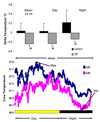Effect of caloric restriction in non-obese humans on physiological, psychological and behavioral outcomes
- PMID: 18502453
- PMCID: PMC2535933
- DOI: 10.1016/j.physbeh.2008.04.017
Effect of caloric restriction in non-obese humans on physiological, psychological and behavioral outcomes
Abstract
The focus of this review is on current research involving long-term calorie restriction (CR) and the resulting changes observed in physiological and behavioral outcomes in humans. Special emphasis will be given to the first completed clinical studies which are currently investigating the effects of controlled, high-quality energy-restricted diets on both biomarkers of longevity and on the development of chronic diseases related to age in humans. Prolonged CR has been shown to extend both the median and maximal lifespans in a variety of lower species such as yeast, worms, fish, rats, and mice. Mechanisms of this CR-mediated lifespan extension are not fully elucidated, but possibly involve significant alterations in energy metabolism, oxidative damage, insulin sensitivity, and functional changes in both the neuroendocrine and sympathetic nervous systems. In this brief report, we review some of the major physiological, psychological and behavioral changes after 6 months of CR in overweight otherwise healthy volunteers. Ongoing studies of prolonged CR in humans are now making it possible to analyze changes in "biomarkers of longevity" to unravel some of the mechanisms of its anti-aging phenomenon. With the incremental expansion of research endeavors in the area of energy or calorie restriction, data on the effects of CR in animal models and human subjects are becoming more accessible. Detailed analyses from controlled human trials involving long-term CR will allow investigators to link observed alterations from body composition down to changes in molecular pathways and gene expression, with their possible effects on the biomarkers of aging.
Figures


References
-
- McCay CM, Crowel MF, Maynard LA. The effect of retarded growth upon the length of the life span and upon th eultimate body size. J Nutr. 1935;(10):63–79. - PubMed
-
- Heilbronn LK, Ravussin E. Calorie restriction and aging: review of the literature and implications for studies in humans. Am J Clin Nutr. 2003;78(3):361–369. - PubMed
-
- Ingram DK, et al. The potential for dietary restriction to increase longevity in humans: extrapolation from monkey studies. Biogerontology. 2006 - PubMed
-
- Bodkin NL, et al. Mortality and morbidity in laboratory-maintained Rhesus monkeys and effects of long-term dietary restriction. J Gerontol A Biol Sci Med Sci. 2003;58(3):212–219. - PubMed
-
- Lane MA, et al. Energy balance in rhesus monkeys (Macaca mulatta) subjected to long-term dietary restriction. J Gerontol A Biol Sci Med Sci. 1995;50(5):B295–B302. - PubMed
Publication types
MeSH terms
Grants and funding
LinkOut - more resources
Full Text Sources
Medical

